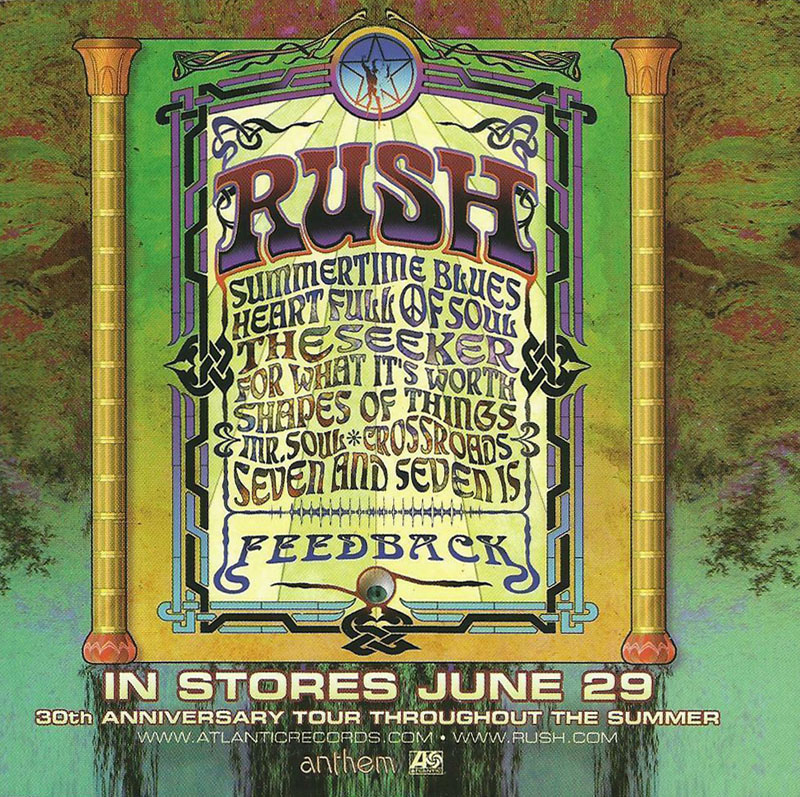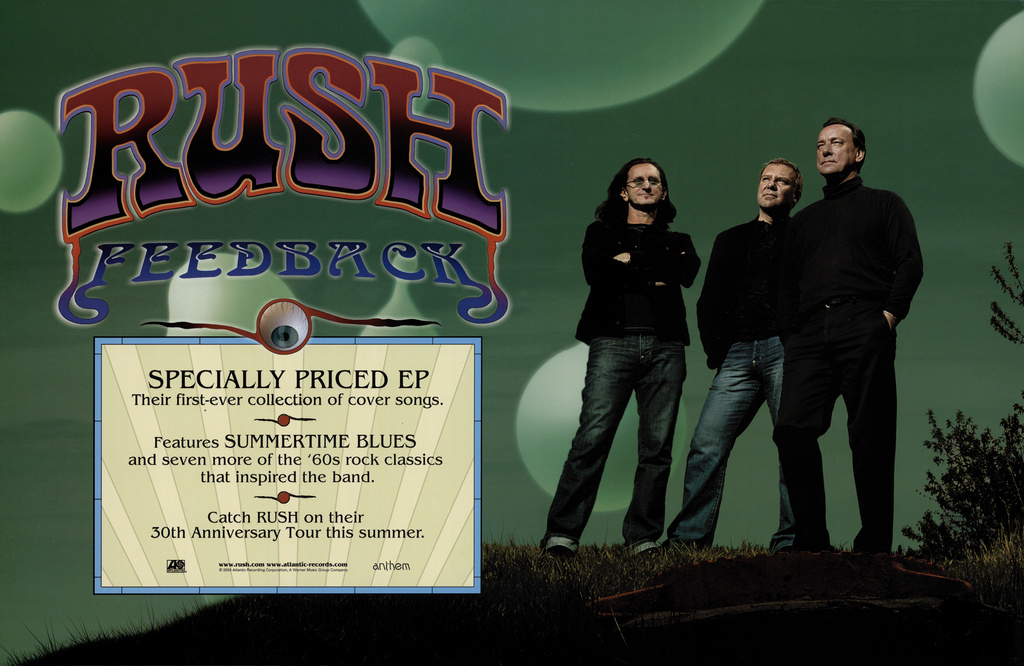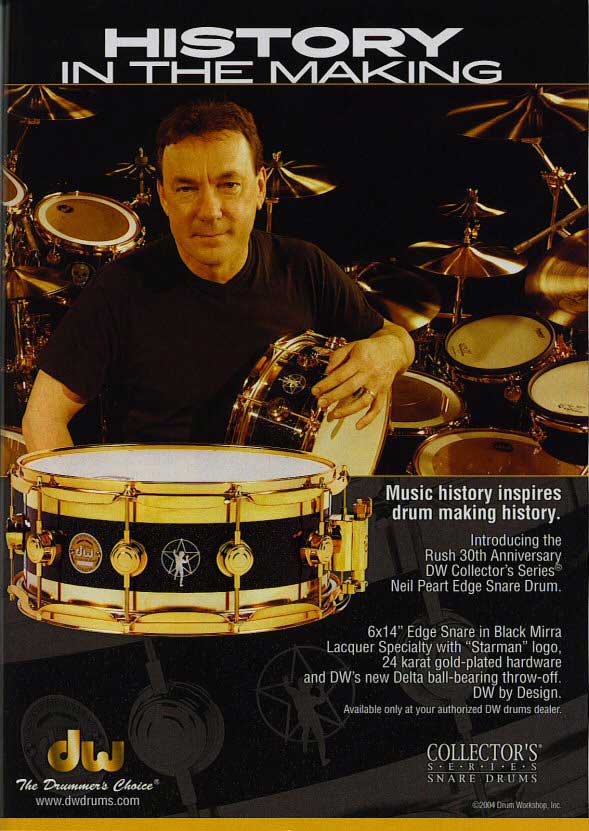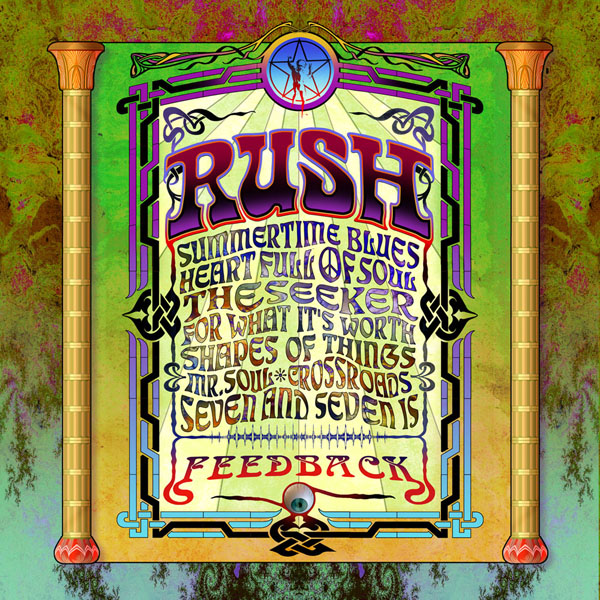
Summertime Blues (3:52)
Heart Full Of Soul (2:52)
For What It's Worth (3:30)
The Seeker (3:27)
Mr. Soul (3:51)
Seven And Seven Is (2:53)
Shapes Of Things (3:16)
Crossroads (3:27)
Feedback Linernotes
By Neil Peart
The room in suburban Toronto was dimly lit with bead lights, lava lamps, and candles. Patterned rugs, guitars, amplifiers, and drums were scattered about the floor. The guitarist, bass player, and drummer locked into a fast blues jam, a relaxed acoustic number, a traditional rock anthem. As the music spiraled out, the air filled with the sounds of feedback, backwards guitar, electric twelve-string, and electric sitar. The lava lamps vibrated on the straining amplifiers. Everything was ... very ... beautiful ...
It was April of 2004, but Geddy, Alex, and I were channeling back to 1966 and 1967, when we were thirteen- and fourteen-year-old beginners. We thought it would be a fitting symbol to commemorate our thirty years together if we returned to our roots and paid tribute to those we had learned from and were inspired by. We thought we might record some of the songs we used to listen to, the ones we painstakingly learned the chords, notes, and drum parts for, and even played in our earliest bands.
Ironically, I first heard many of these songs as "cover tunes," played by the local bands around St. Catharines, Ontario, in the mid-sixties. The Who and the Yardbirds were both introduced to me that way. A couple of years later, my own first band, called Mumblin' Sumpthin' (from a "L'il Abner" comic, I shall forever have to explain), played Cream's "Crossroads" and the Blue Cheer version of "Summertime Blues."
At the same time, across the lake in the suburbs of Toronto, Alex played "For What it's Worth" in his first band, The Projection, and later, with Geddy, they also played "Mr. Soul," "Shapes of Things," and "Crossroads," in early versions of Rush, and other bands with names like Dusty Coconuts, Waterlogged Gorilla Fingers, the Wild Woodpecker Revue, and the Aquiline Dimension of the Mind (depending on the day).
The other tracks on this collection are songs we liked from the era that we thought we could "cover" effectively (meaning not too many backing vocals), and have some fun with. The music celebrates a good time in our lives, and we had a good time celebrating it.
GEDDY LEE - Bass Guitar, Vocals
ALEX LIFESON - Guitars (electric, acoustic, mandola)
NEIL PEART - Drums and Cymbals
Produced by David Leonard and RUSH at Phase One Studios, Toronto - March/April, 2004
Recorded by David Leonard at Phase One Studios, Toronto - March/April, 2004
Mixed and Engineered by David Leonard at Phase One Studios, Toronto - May 2004
Phase One Pro Tools recording by Michael Jack, Assistant - Jeff Muir
Mastered by Stephen Marcussen, Marcussen Mastering, Hollywood.
Management by Ray Danniels, SRO Management, Toronto
Executive Production by Anthem Entertainment - Liam Birt and Pegi Cecconi
Feedback Equipment Care and Feeding by Lorne Wheaton and Rick Britton
Art Direction, Illustration and Design - Hugh Syme / Photography - Andrew MacNaughtan
Thanks to everyone at Phase One Studios - Barry, Donny, Mike, and Jeff and everyone at SRO - Ray Danniels, Pegi Cecconi, Shelia Posner, Shelley Nott, Anna LeCoche, Cynthia Barry, Rayanne Lepieszo, Any Curran, Bob Farmer, and Randy Rolfe.
As always, we thank our families for their patience, support, tolerance, and love.
Extra Special Thanks to Jason Sniderman, for planting the seed, research, and endless encouragement.
For technical help & contributions, our thanks to Saved By Technology - Jim Burgess & Ted Onyszczak; DW Drum, Sabian Cymbals, & Promark drumsticks.
© 2004 Atlantic Records © 2004 Anthem Entertainment
Notes
- Atlantic/Anthem, June 29, 2004
- Highest Billboard Chart Position: 19
- "Summertime Blues" was released as a single; the German edition included unique cover art.
- A 7" limited edition vinyl colored single of "Seven And Seven Is" was released in the US & Canada on April 19, 2014 for Record Store Day. The vinyl was part of the "Side By Side" series, where the flip side contained the original version by Love released in 1966.
- Reissued January 15, 2016 by Universal Music Enterprises on 200-gram, heavyweight vinyl with a download code for a 320kbps MP4 vinyl ripped Digital Audio album as well as high resolution Digital Audio editions in DSD (2.8mHz), 192khz / 24-bit, 96kHz / 24-bit.

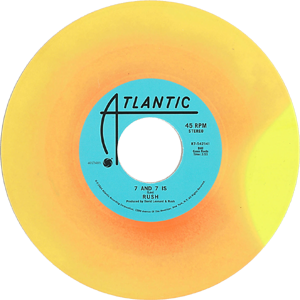
In Their Own Words
"This is the first time we have gone out [on tour] when we didn't have a project that we felt passionately about. We've been very successful not trading on that cliche where you're depending on your past. After I thought about it a while, I decided it's quite an accomplishment to stay productive for 30 years as a rock band, and having this cover project made it OK. It gave us something to occupy ourselves creatively and helped justify it to me....We had no plans to do an album of any kind at first, then somebody approached us about doing the tour. A friend planted the idea: Wouldn't it be fun to play a few songs that we liked when we first were learning our instruments and release an EP." - Geddy Lee, The Charlotte Observer, May 28, 2004
"During rehearsals for Rush's Vapor Trails tour, in the spring of 2002, the three of us discussed the idea of each of us choosing an old song by bands from our youth, to have something different we could play in the show, perhaps as encore songs, or alternating "treats" to spice up the set." - Neil Peart, Traveling Music, page 145
"We always talked about throwing a cover or two into the encore just for fun. When we put this 30th anniversary tour together, we realized that we didn't have enough time to do a proper studio album. A friend of mine suggested, 'Well, maybe you guys should dip into your past. Play some songs you used to play when you were in your formative years. Just record them quickly for fun, not overthink it, and just put out a little EP to celebrate where you were as opposed to where you are.' We thought it might be a way to juice us before the tour, so that's what we did." - Geddy Lee, The Columbus Dispatch, June 2, 2004
"Anthem/Atlantic recording group Rush has unveiled details of their upcoming new collection, dubbed Feedback. This unique set sees the renowned trio - Geddy Lee, Alex Lifeson, and Neil Peart - celebrating the band's 30th anniversary by performing cover versions of eight rock classics from the Sixties. Feedback is slated to arrive in stores on June 29... Feedback marks the first time that Rush has recorded songs by other artists and writers. Included are such groundbreaking staples as Buffalo Springfield's 'For What It's Worth' and 'Mr. Soul,' the Yardbirds' 'Heart Full of Soul' and 'Shapes of Things,' and the Who's 'The Seeker.' Feedback also features versions of two songs which defined the heavy rock power trio tradition that gave birth to Rush - Cream's explosive take on Robert Johnson's 'Crossroads' and Blue Cheer's still-extreme rendition of Eddie Cochran's 'Summertime Blues.'..." - Feedback Press Release, Rush.com, May 14, 2004
"I think about covers from time to time, it would be fun. Of course, I would always choose a Who song if I was going to do that type of thing. That might be a fun thing for Rush down the road, to interpret somebody else's music." - Geddy Lee, Jam! Showbiz chat, Thursday, December 21, 2000
"'Geddy, Alex, and I were channeling back to 1966 and 1967, when we were thirteen- and fourteen-year-old beginners,' writes Peart in the liner notes to Feedback. 'We thought it would be a fitting symbol to commemorate our thirty years together if wereturned to our roots and paid tribute to those we had learned from and were inspired by. We thought we might record some of the songs we used to listen to, the ones we painstakingly learned the chords, notes, and drum parts for, and even played in our earliest bands'." - Feedback Press Release, Rush.com, May 14, 2004
"We called the project Feedback because when Geddy and Alex were working on demos, they decided to have feedback and backwards guitar on every song." - Neil Peart, Soundspike.com - July 30, 2004
"There was talk of doing a tribute record in our honor, and we really weren't that keen on the idea. We thought that it made more sense to do a tribute to some of the bands and music that we grew up with as 12-, 13-year-old kids learning to play guitar. And that ended up being just so much fun. We just had such a ball doing that." - Kansas City Star, June 11, 2004
"We talked about maybe doing a couple cover songs making them available on our website but once we got into it, we fell in love with the idea. We were having so much fun that we expanded it to 8 songs and if we'd had the time, we could easily have done 12 or 13 songs and made a full album." - Alex Lifeson, Epiphone.com, July 29, 2004
"We wanted to do something we could price specially and make it more like a gift, like a birthday present in a way, rather than do one of these big expensive box sets that becomes an onerous thing on our fans. We wanted to do something that was fresh and fun, and that wouldn't be a big stretch for someone to check out." - Geddy Lee, Las Vegas Sun, July 16, 2004
"Unlike the exacting conditions under which Rush usually records, Lifeson says Feedback was a more relaxed affair, with the trio playing together in a studio decked out with lava lamps, candles and carpets." - Cleveland.com, June 4, 2004
"We were working in new territory because of the time constraints. It was almost completely recorded live, although we did go back and add a guitar solo or vocal overdub here and there...After this tour we'll be starting work on the next Rush album. Recording Feedback was incredibly refreshing. We'll probably use some of the techniques we learned when working on our next album." - Geddy Lee, The Arizona Republic, July 10, 2004
"Lifeson says, the band 'Rushified' the enduring tunes, giving them their own edge. 'We didn't want to copy them as they were,' he says. 'We didn't see the point. We changed some of the songs around, gave them different character'." - STLToday.com, June 9, 2004
"I guess our criteria was to pick songs that we played at one time and the ones that really moved us. Like 'For What It's Worth,' by the Buffalo Springfield, for example, is probably my all-time favorite song. And 'Heart Full of Soul', you know, I don't know how many people recognize that song. That's a great arrangement we did of that. I know that's Geddy's favorite song. 'Summertime Blues' is pretty straightforward. It's kind of a cross between Blue Cheer and The Who. It's got that real great summery feel about it, and it's that youthful abandon. We have our style, and if we can put a little bit of that in some of these great songs from that era, you know we're not afraid of anything." - Alex Lifeson, Kansas City Star, June 11, 2004
"We combined the Who's and Blue Cheer's versions of 'Summertime Blues,' and ended with me playing the innovative drum pattern from Blue Cheer's 'Just a Little Bit,' from Outsideinside, which I had never forgotten." - Neil Peart, RollingStone.com, October 21, 2009
"(The Yardbirds') Heart Full of Soul, I think, is one of the best things we've ever recorded. Makes me wonder if we should have stopped recording." - Geddy Lee, The Columbus Dispatch, June 2, 2004
"The criteria was that it had to be something that we could call our own, but at the same time we wanted to pay homage to the people we liked without wrecking the song. That was the No. 1 rule: we couldn't wreck the song....We wanted to do a Jimi Hendrix song, because he was so influential. But you can't touch Jimi, man. He's untouchable. We put together a rough version of 'Manic Depression', which is just an awesome song. But you put my voice on that, and it just sounds all wrong. You put this skinny little white guy from Canada on there, and it's just not the same vibe." - Geddy Lee, Rocky Mountain News, June 28, 2004
"Not Fade Away" was the first song we recorded - I forgot about that one. That was back in 1973, the first time we went into the studio. We should have recorded that one (for the new EP), too...The only way to convincingly record someone else's music is to make it your own in some way. Sometimes you're more successful than others...You're imposing your own style of playing on anybody's material. We tried a few Led Zeppelin songs and Hendrix songs, but those groups' personalities are so indelibly etched in the songs, it just doesn't work for somebody else (to attempt them)." - Geddy Lee, The Charlotte Observer, May 28, 2004
"We sort of toyed with the idea of including a Beatles song, or two Beatles songs - maybe 'I Feel Fine' or 'Day Tripper'. We sort of jam out on that a little bit...There was some stuff that seemed sacred, that didn't seem right, and ('Manic Depression') was one for sure - it's such a personal song for Hendrix. And instrumentally, it sounded fine, but with Geddy's voice, it sounded too alien and weird...going through this stuff for Feedback, I realized how much of me is Jeff Beck and especially Pete Townshend. When I list the people who inspired me as a kid, I usually say Eric Clapton and especially Jimmy Page. But really, I think Townsend's probably one of the biggest influences I ever had - really taught me something about chords and how to create a big guitar sound without turning it up really loud." - Alex Lifeson Las Vegas Review-Journal, July 16, 2004
"Our vision was 1966, when we were teenagers. We just decided to pick songs from our youth that we liked and make a tribute album to the people we grew up on. For instance, we did 'Summertime Blues' and kind of combined the arrangements of Blue Cheer and The Who, and did Buffalo Springfield's 'For What It's Worth,' and this other obscure '60s band called Love, a song called 'Seven and Seven Is.' All of us loved being freed from the material--in other words, not being responsible to think it up. And we did it our own way, of course, but we paid a little due respect to the times. We called the project 'Feedback' because when Geddy and Alex were working on demos, they decided to have feedback and backwards guitar on every song." - Neil Peart, Soundspike.com, July 30, 2004
"The ultimate test was going into the studio three or four weeks ago to record ["Feedback"], which is kind of a tribute album to our youth. We recorded songs by The Who, The Yardbirds, Buffalo Springfield, Cream, and that sort of thing, to put out as an anniversary celebration of our own. I used the new drums [the DW R30 tourkit] and the new [Paragon] cymbals and just couldn't believe how well they worked in the studio. Both [drum tech] Lorne [Wheaton] and I were so pleased. I got to do things like play the downbeat on the bell of a ride cymbal, stuff that I'd never do. I'm able to pull out more uses of the tools, I guess is one way to put it. I was able to find new ways to use the cymbals because of their potential, and noticing right away the character of the crash cymbals as a punctuation mark; this suddenly had a whole new presence to it." - Neil Peart, "After Class With The Professor", DrumMagazine.com, July 17, 2004
"...there are Zeppelin songs that we wanted to do, but we felt that you just can't touch Zepellin, in some ways. Same with Yes. There are more old Yardbirds songs that we could've done, I suppose. And the Who songs go on forever - just the greatest songs ever. We toyed with the idea of doing 'I Can See For Miles.' We toyed with the idea of doing (Zep's) 'Good Times, Bad Times.'" - Geddy Lee, Fender.com - December 20, 2005
"The '60s hippie-pride standard 'For What It's Worth' gets another airing here, but unlike Ozzy Osbourne's stupidly shiny take, Rush does the song proud, starting in a mellow vein and getting stormy at the end-just like the '60s itself. It helps that Feedback includes a second Buffalo Springfield song-Neil Young's 'Mr. Soul'-along with a pair of Yardbirds covers that help locate this record's heart somewhere between Sunset Strip and Swinging London. Like a lot of the covers albums on this list, Feedback is too thick and overplayed, but Rush comes closer to getting the low, gritty vibe of a song like The Who's 'The Seeker' than a lot of its supercharged brethren. Most unlikely cover: At a glance, Love's 'Seven And Seven Is' would seem to be a nutty choice for Rush, but it fits well into Feedback's free-love/bad-trip spirit." - The A.V. Club, June 21, 2006
Tour Comments
"The Camera Eye, from our Moving Pictures album, is almost always at the top of the request list. We've given it a shot, but we always go, 'Well, I just don't want to play that song. I'm not thrilled about it.'...You don't want to disappoint, but you have to be honest." - Geddy Lee, The Columbus Dispatch, June 2, 2004
"I know that people always request us to play (1981's) 'The Camera Eye,' and every tour we think about that. But we just don't dig playing that song, and if you don't dig playing it, you're not gonna play it well. It has nothing to do with whether it's a good song or not. If you're not getting off on it, you're not gonna do a good job with it on a nightly basis." - Geddy Lee, Las Vegas Sun, July 16, 2004
"Judging by the response to this tour there will always be an audience for us. Our relationship with our audience is really special. We like getting together. We come out and share this one moment together and think about all the years (performing for them). As long as we have the heart to do this to the same degree and level we've always done it, it will go on forever." - Alex Lifeson, TimesLeader.com, August 4, 2004
"I traveled here on my motorcycle because I want to write a book about this tour and I thought there's no better way to start the book than with a road trip, so I rode the bike from LA to here, to Nashville. It took three days, two thousand miles, it was a slog, but I wanted that immersion in America and the American road, especially to begin the tour, because to me there couldn't be a better set up to build the tour from." - Neil Peart, Classic Rock, October 2004
Promos
Smartphone Wallpaper
Our RUSH smartphone wallpapers have been modified for a 9:19.5 aspect ratio to fit "most" Smartphones.
This is a collection of transcripts of magazine and newspaper articles and other media related to this release or coinciding with the time frame surrounding it. This is an ongoing work in progress; feel free to email any suggested additions.

